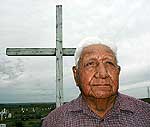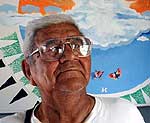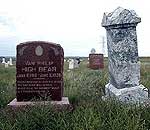By Mark Steil
Minnesota Public Radio
September 26, 2002
After the 1862 Dakota conflict, Minnesota's Dakota Indians were expelled from the state. It was one of the most heartbreaking results of the war. It broke out in the Minnesota River Valley. When the Dakota were defeated, the federal government rounded up the survivors and sent most of them to Crow Creek, S.D. Disease and starvation killed many of them. There's still a reservation there, and times are still hard.
| |
|
|
|
||
Vernon Ashley is in a hurry. He has many memories and is eager to show them to a visitor.
On his left is a highway. To the right, a green strip of trees and grass. Beyond that is the blue Missouri River. He stops, and points with his right arm.
"I was born in 1916, from that pointed bank you see there - about 200, maybe 300, yards this way," Ashley says.
There's nothing left of the house now. In fact, there are few signs that anyone lived in these hills. The reservation hugs the east bank of the Missouri River in the middle of South Dakota. Ashley was the Crow Creek tribal chairman in the 1950s, but eventually moved off the reservation. He lives about 60 miles away now in Pierre, S.D. But he still remembers his boyhood neighbors.
"His Battles lived up here, Yellow Dog up the river, Little Eagle, Round Head and all of these people, were all living in here. But those people were hearty, they were devoted to themselves, to survive," says Ashley.
His Dakota ancestors had to be tough. Some had gone through war, and been shipped here from Minnesota and other parts of the Midwest. Others were the sons and daughters of the deportees.
| |
|
|
|
||
"Our people were brought from Fort Snelling in barges. Down the Mississippi River to St. Louis, and then back up the Missouri River, and brought to this area," says Ashley.
The Indians were expelled from Minnesota by the government. The action followed a war in 1862 between the Dakota Indians, settlers and government soldiers.
Some Dakota fled the state when the war ended. Many of those had fought in the war, and they feared being captured. Some were caught and tried, and sentenced to death. Thirty-eight were hanged in Mankato in December 1862.
But most Dakota did not fight, and even opposed the war. They knew they were innocent and had no reason to leave Minnesota. But when the fighting ended, Ashley says all the Dakota were rounded up and shipped west. For some, it was a death sentence.
Of the 1,300 people that was on those barges, 300 died," says Ashley.
A memorial was dedicated this year on the Crow Creek reservation to those who died. The survivors found that Crow Creek was a difficult place to live. There were frequent droughts, and wild game was scarce.
|
"At that time, all they wanted to do was get them Indians out of the way, so they could come and live there."
- Elmer Weston, on the forced relocation of Dakota Indians to Crow Creek, S.D. |
Ashley's family stayed at Crow Creek, but many moved on. Some went to Nebraska, North Dakota and even Canada. Some returned to Minnesota.
The Minnesota Dakota waited until the uproar over the 1862 war had subsided. Then they walked hundreds of miles back to the state. Despite the forced removal of his people, Ashley is not bitter.
"We had to accept it. What else do we have? And we learned to adjust our lives to it," says Ashley.
Not all Indians are so accepting. Elmer Weston lives near Flandreau, S.D. His ancestors were sent to Crow Creek in the 1860s, but after a few years they moved to Nebraska. Later they returned to South Dakota to farm on homestead claims near Flandreau.
Weston is 81 years old. When he was a boy, he knew people who lived through the 1862 war and the expulsion from Minnesota. One woman told him she saw a lot of children die at Crow Creek.
"They didn't get any food when they were there. They get some kind of a sickness where they cry - you know they're sick. They cry, they cry. When they quit crying, that's when they die," he says.
| |
|
|
|
||
Weston also remembers hearing his grandfather talk about the 1862 war. His grandfather was shipped to Crow Creek with the rest of the Dakota. He had a very personal way of expressing his bitterness over the treatment. Weston says he refused to speak English.
"(In) summertime we wanted to stay at the boarding school, because we like it. He'd say, 'No, you can't stay over there, you better come home. You might forget how to talk Indian', he says. He didn't want us to lose our Indian language," Weston says.
Weston says what still hurts is that after the 1862 war, every Indian was treated the same. He says even those who helped white settlers escape the fighting were shipped out.
"At that time all they wanted to do was get them Indians out of the way, so they could come and live there," says Weston. "They must have planned it that way too - this uprising. The government did. They don't feed them, so they can go to war. They have an excuse to move them out of there."
Vernon Ashley bends his 6 ft. 3 in. frame in two over his mother's tombstone on the Crow Creek reservation. He's tearing up the tall grass crowding her memory.
"Just a shame we don't keep these graves up," he says.
Ashley says the cemetery is one of many things that need attention at Crow Creek. Just as his childhood home is gone, he says the reservation of his youth has disappeared.
The Indians shipped here after the 1862 war had nothing, but he says his people were honest and hardworking. Ashley says things are different now, and he pins the blame on the tribal government
"They've lost all principles. They run it like dictators," he claims.
The reservation is almost $35 million in debt. Ashley says he's found many examples of wasteful, possibly fraudulent, spending. He says in one case, the tribal council paid off the gambling debt of one of its members. He says the leaders of his boyhood would never have done that.
"They were not educated men, but the one thing I said - they were honest," Ashley says. "They were dedicated to helping their people. They wouldn't take a dime if it wasn't theirs. But we lost that."
Ashley says the current leadership is to blame. Tribal chairman Duane Big Eagle refused to comment for this story. Ashley wonders what his ancestors would think.
"Our people have just gone downhill. Just think of what they came from. Some dedicated, strong people - to come down to what we are now," says Ashley. "What's ruined the race is welfare. A lot of these people grew up in a dependent society. A lot of those councilmen up there - that's all they know is welfare."
Ashley is leading an effort to get rid of Crow Creek's tribal structure. But his solution takes him back to the same institution that brought immeasureable pain to his people. Ashley wants the U.S. government to run the tribe's affairs while it searches for a way out of the crushing debt load.
It's been almost 140 years since a tragic war gave birth to the Crow Creek reservation. Misfortune is nothing new.
More from MPR


